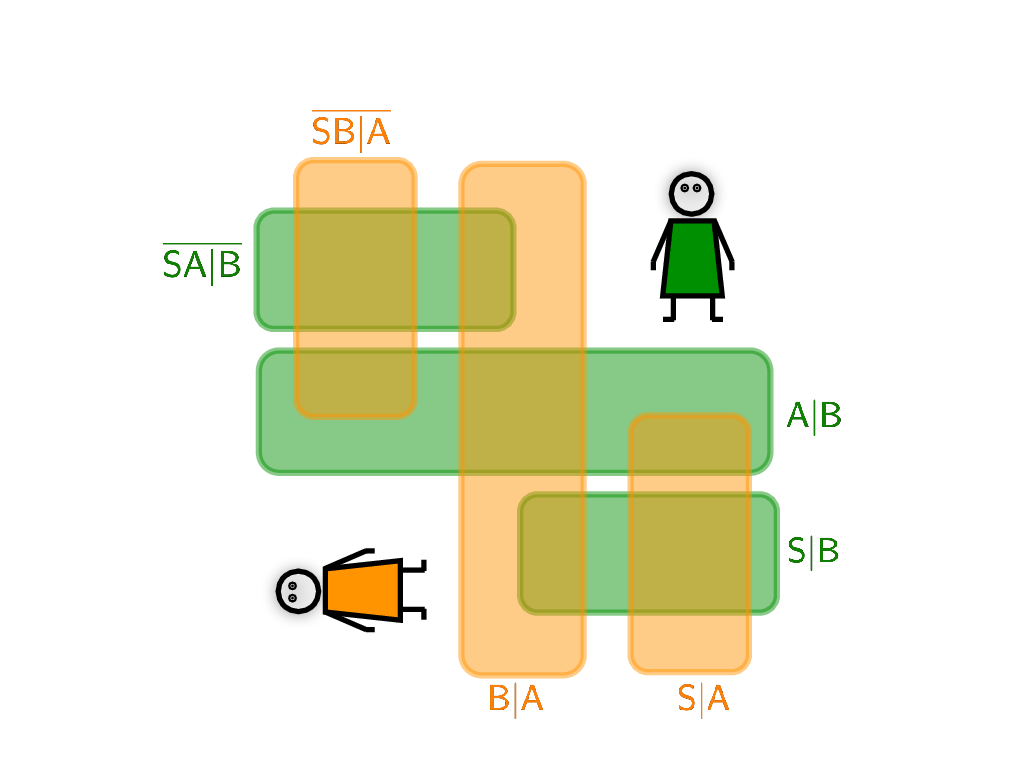
We study the interplay between quantum mechanics and spacetime. Broadly, our interest is guided by the following questions:
What are the ultimate limits that quantum mechanics and general relativity together impose to our ability to operationally define spacetime quantities (and what lies beyond these limits)?
Reciprocally, what are the ultimate limits that general relativity imposes on the basic conceptual building blocks of quantum theory, such as states, time evolution, measurements and probabilities (and what lies beyond these limits)?
We aim at shedding light on these questions from a quantum foundations / quantum information point of view.
More specifically, our work concentrates around the following sub-topics:
What happens to our description of physical systems when we promote our reference frames from classical systems to quantum? How do we change between the perspectives of different quantum reference frames? This is the study of quantum reference frame transformations.
In [1], we study the notion of subsystem relative to a quantum reference frame. We discover new degrees of freedom, which characterise the quantumness of our reference frames. This “extra particles” might be a key ingredient to our understanding of the world “as seen” by a quantum reference frame.
[1] Castro-Ruiz, E., & Oreshkov, O. Relative subsystems and quantum reference frame transformations. arXiv preprint arXiv:2110.13199. (2021).
Measuring spacetime quantities at the interplay between quantum theory and general relativity raises several interesting questions. In particular, how do we characterise quantum time evolution in the absence of an external time parameter, as demanded by general relativity? What are the limits to our ability to define time evolution, by means of physical clocks, at the overlap between quantum mechanics and general relativity?
In [2] we find fundamental limitations to our ability to operationally define time intervals at different spatial locations due to a gravity-mediated entangling effect between quantum clocks.
In [3] we compare two well-known frameworks to describe consecutive measurements on a quantum system in the absence of an external background time. We find that, if measurements are modelled dynamically and clocks do not have infinite resources, there are modifications to our well-known notions of time evolution and definite temporal order.
[2] Castro Ruiz, Esteban, Flaminia Giacomini, and Časlav Brukner. "Entanglement of quantum clocks through gravity." Proceedings of the National Academy of Sciences 114.12: E2303-E2309. (2017).
[3] Hausmann, L., Schmidhuber, A., & Castro-Ruiz, E. Measurement events relative to temporal quantum reference frames. arXiv preprint arXiv:2308.10967. (2023).
When considering quantum information In relativistic scenarios, it is important to understand what happens to the information-carrying systems as they are subjected to a broader class of symmetries.
In [4], we study the entanglement between two spin systems as the particles are Lorentz-transformed. In a simple scenario, we demonstrate the existence of “decoherence free subsystems” that allow us to store in principle an arbitrary amount of spin entanglement, which remains undisturbed under the action of relativistic transformations.
[4] Castro-Ruiz, E., & Nahmad-Achar, E. Entanglement properties of a system of two spin-1 particles under a Lorentz transformation. Physical Review A—Atomic, Molecular, and Optical Physics, 86(5), 052331. (2012).